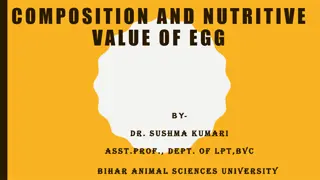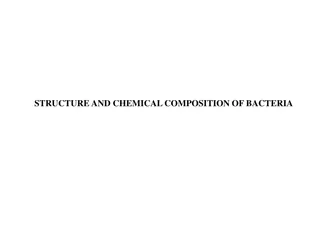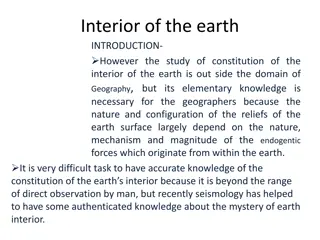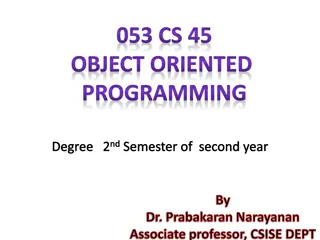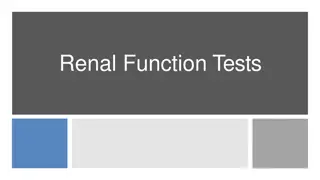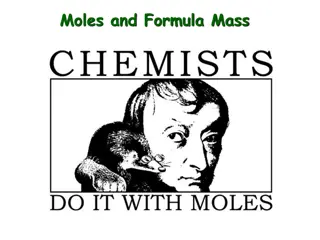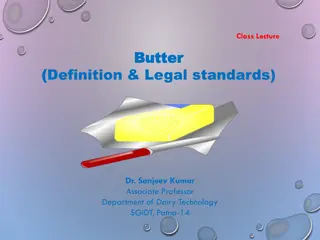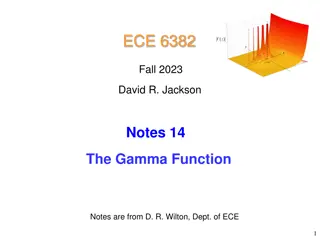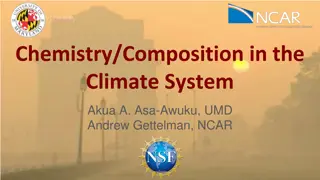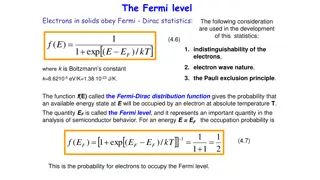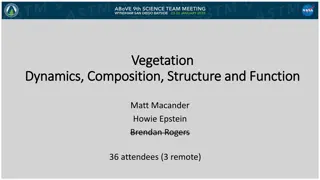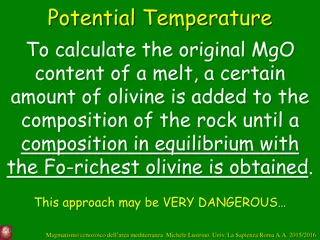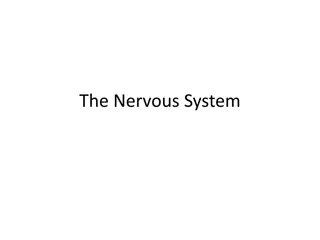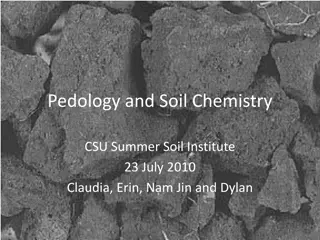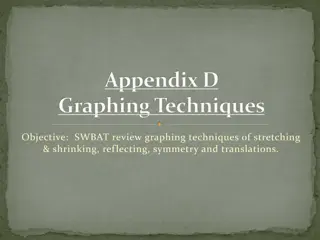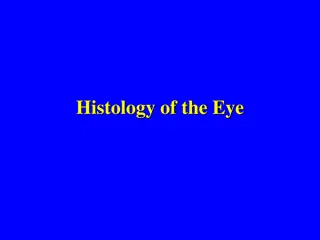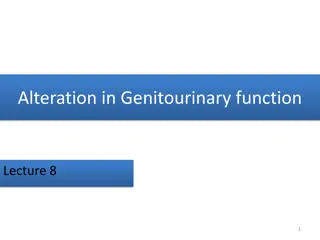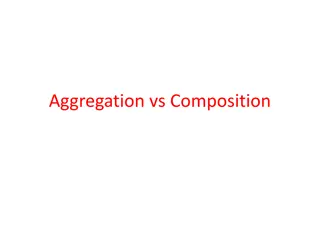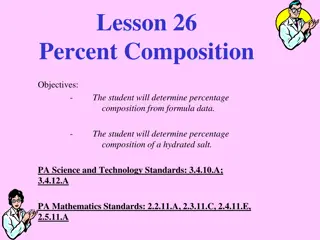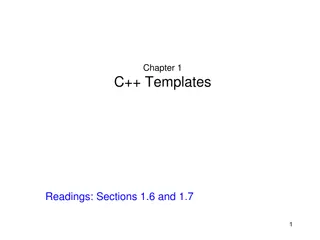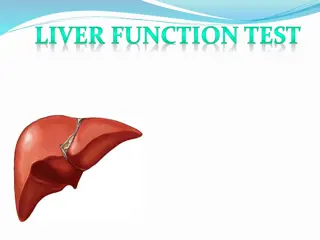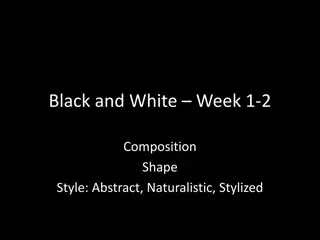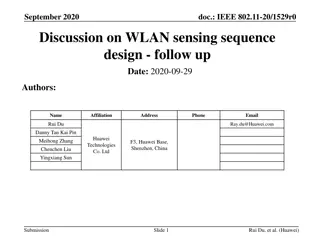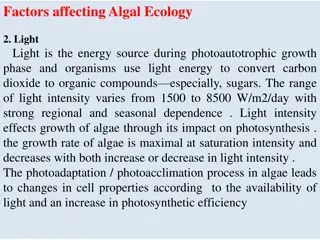Understanding Renal Function Tests: Lecture Insights on Kidney Function and Structure
This lecture delves into the essential aspects of renal function tests, exploring the functional units of the kidney, the role of nephrons in maintaining homeostasis, and the intricate processes of filtration, reabsorption, and secretion within the renal tubules. Key topics include the hormonal and
4 views • 17 slides
Exploring the Composition of Earth's Oceans
Delve into the composition, location, and subsurface topography of the world's oceans, discovering the chemical makeup of ocean water and its vast salt content. Uncover fascinating facts such as how the salt in the oceans could create a 500-foot thick layer if spread over Earth's land surface. Engag
1 views • 16 slides
Principles of Architecture: Unity, Contrast, Mass Composition
Explore the fundamental principles of architecture focusing on unity, contrast, and mass composition. Unity emphasizes harmony among building elements, contrast adds interest without disrupting unity, and mass composition involves arranging shapes in a harmonious way. Proportion and scale play key r
0 views • 24 slides
Understanding Atmosphere Composition and Structure in Climatology
The study of climatology, focusing on the atmosphere, is presented by Dr. Banashree Saikia, covering topics such as atmospheric composition, insolation, temperature variations, atmospheric pressure, wind systems, atmospheric moisture, climatic classification, cyclones, and monsoons. The atmosphere,
1 views • 9 slides
Nutritive Value and Composition of Eggs by Dr. Sushma Kumari
The composition and nutritive value of eggs, as presented by Dr. Sushma Kumari from Bihar Animal Sciences University, cover various aspects including the physical composition of eggs, the composition of an eggshell, and the chemical composition of eggs. The presentation delves into details such as t
0 views • 19 slides
Bacterial Cell Structure and Composition Overview
Bacterial cells exhibit variations in size, typically ranging from 0.75 to 1.5 micrometers. The cell envelope, comprising glycocalyx, cell wall, and cell membrane, plays crucial roles in protection and cell function. The cell membrane, a thin barrier rich in phospholipids and proteins, is integral t
1 views • 28 slides
Understanding the Composition of Earth's Interior: Insights from Density, Pressure, and Temperature
The constitution of the Earth's interior plays a crucial role in shaping the surface features we observe. Although direct observation is challenging, seismic studies offer valuable insights. The density, pressure, and temperature within the Earth provide essential clues to its composition. Rocks' de
0 views • 14 slides
Understanding Function Templates and Generic Programming in C++
Dive into function templates and generic programming in C++, exploring how to create reusable code for multiple data types. Learn about generic function templates, class templates, and how to declare function templates efficiently. Enhance your understanding of type-independent patterns and how to i
1 views • 32 slides
Understanding Renal Function Tests and Kidney Health
Renal function tests are essential for diagnosing and monitoring kidney health. These tests assess functions like glomerular filtration, tubular reabsorption, and endocrine functions of the kidneys. Common indicators include serum urea, creatinine levels, and more. It's crucial to evaluate renal fun
0 views • 34 slides
Understanding Environmental Hygiene: Air Pollution and Composition of Air
The content delves into the concept of atmospheric pollution, the composition of pure and impure air, sources of air pollution, and the zones of the atmosphere. It highlights the detrimental effects of pollutants on health and the environment, emphasizing the importance of environmental hygiene. The
1 views • 27 slides
Understanding RISC-V Function Calls
In RISC-V function calls, the decision to place variables in caller-saved or callee-saved registers depends on various factors such as recursion and variable usage within the function. Additionally, understanding how function arguments are passed and stored is crucial for efficient program execution
0 views • 5 slides
Understanding Moles and Formula Mass in Chemistry
Dive into the world of moles, Avogadro's number, and formula mass calculations in chemistry. Learn how to convert moles to grams, grams to moles, and determine the number of atoms using Avogadro's number. Explore the concepts of formula mass and percentage composition to understand the composition o
0 views • 19 slides
Understanding Butter: Definition, Standards, and Composition
Explore the definition of butter according to FSSAI standards, including its composition, permitted additives, and classifications based on acidity, salt content, end-use, and manufacturing practices. Discover the nutritional composition and fatty acid profile of butter along with essential informat
0 views • 10 slides
Introduction to Gamma Function and Equivalent Integral Forms
The Gamma function is a versatile mathematical function that generalizes the factorial function to non-integer and complex values. It has various integral definitions such as the Euler-integral form. The proof of the factorial property of the Gamma function is demonstrated through analytical continu
1 views • 20 slides
Secure Composition of Key Exchange Protocols
Explore the game-based composition approach for key exchange protocols, focusing on ensuring security in compositions with arbitrary tasks and the universal composability of protocols. Delve into the Bellare-Rogaway security model and the details of security games in protocol analysis. Understand ke
0 views • 25 slides
Understanding Chemistry and Composition in the Climate System
Dive into the intricate relationship between chemistry and composition in the climate system, exploring topics such as radiative effects, stratosphere-troposphere coupling, aerosol-cloud interactions, and the impact of various gases and particulates on radiative forcing. Discover how changes in comp
0 views • 25 slides
Understanding Soil Composition and Importance
Explore the world of soil and its significance as a natural resource by discovering its composition and how it affects plant growth. Learn about the main ingredients of soil, its permeability, and the role of water, air, and organic matter. Gain insights into how soil supports plant life through lea
1 views • 30 slides
Comprehensive Guide to Nutritional Value and Composition of Vegetables
Vegetables are herbaceous edible plants cultivated for consumption in various forms like fresh, cooked, or as salads. They are rich in essential nutrients such as protein, carbohydrates, vitamins, and inorganic salts. The tables provided detail the main nutrient constituents and composition of vario
1 views • 25 slides
Understanding Fermi-Dirac Statistics in Solids
Electrons in solids obey Fermi-Dirac statistics, governed by the Fermi-Dirac distribution function. This function describes the probability of electron occupation in available energy states, with the Fermi level representing a crucial parameter in analyzing semiconductor behavior. At different tempe
0 views • 9 slides
Insights into Vegetation Dynamics and Function in Ecosystems
Explore the complexities of vegetation dynamics, composition, structure, and function in various ecosystems through discussions on disturbance, wetlands, hydrology, and ecosystem services. Engage in ongoing dialogues about vegetation classification schemas and practical methods like traits mapping t
0 views • 9 slides
Understanding Olivine Equilibrium in Calculating Original Magma Composition
The process involves analyzing olivine in basaltic rocks, selecting olivine with the highest Fo content, calculating the melt composition in equilibrium with this olivine using the distribution coefficient (KD), and determining the potential temperature (Tp) based on the MgO content. The distributio
0 views • 30 slides
Understanding the Nervous System: Structure and Function
The nervous system is a complex network divided into the central nervous system (CNS) and peripheral nervous system (PNS). Neuroglia, or supporting cells, play vital roles in maintaining the health and function of neurons. Neurons, the fundamental units of the nervous system, vary in structure and f
1 views • 29 slides
Soil Chemistry and Mineralogy Analysis at CSU Summer Soil Institute
Explore the comprehensive analysis of soil chemistry, texture, and mineralogy conducted at the CSU Summer Soil Institute in July 2010. The study delves into pedology, elemental composition, particle size distribution, X-ray diffractometry, and mineralogical composition of various soil samples. Detai
0 views • 22 slides
Overview of Graphing Techniques and Functions
Explore graphing techniques including stretching, shrinking, reflecting, symmetry, translations, and various types of functions such as the identity function, square function, cube function, square root function, cube root function, and absolute value function. Understand vertical and horizontal shi
0 views • 25 slides
Monitoring Thyroid Function After Head and Neck Cancer Treatment
This collection of images and data discusses the importance of monitoring thyroid function after head and neck cancer treatment, specifically focusing on post-treatment thyroid function tests, audits of practices in head and neck units, thyroid function post laryngectomy, and the significance of det
0 views • 11 slides
Histology of the Eye: Structure and Function Overview
Explore the histology of the eye, covering the general structure and the microscopic details of the cornea and retina. Learn about the three coats of the eye bulb, including the fibrous, vascular, and neural tunics. Dive into the composition of the cornea, from its transparent and highly innervated
0 views • 24 slides
Understanding Alterations in Genitourinary Function: An Overview
The genitourinary system comprises the urinary and reproductive organs, with the kidneys, ureters, bladder, and urethra playing crucial roles. Maintaining proper function involves factors like renal blood flow, glomerular filtration, tubular function, and urine flow. Nephrons are the functional unit
0 views • 58 slides
Understanding Body Composition: Types, Measurement Methods, and Impacts on Health
Body composition is a key aspect of overall health and fitness. It involves understanding different somatotypes - ectomorph, endomorph, and mesomorph, as well as distinguishing between lean body mass and body fat. Various methods such as underwater weighing, electrical impedance, skinfold measuremen
0 views • 26 slides
Understanding Memory Management in Computer Systems
Dive into the intricacies of memory management with Chapter 5 by Mooly Sagiv. Explore topics such as heap allocation, limitations of stack frames, currying functions, browser events in JavaScript, static scope for function arguments, result of function calls, closures, and more. Gain insights into m
0 views • 86 slides
Understanding the Difference Between Aggregation and Composition in Object-Oriented Programming
Aggregation and Composition are two important concepts in object-oriented programming. Aggregation refers to a 'has-a' relationship where the contained object can survive independently, while Composition indicates that the member object is part of the containing class and cannot exist separately. Th
0 views • 15 slides
Understanding Percentage Composition in Chemistry
Percentage composition is crucial in determining the elemental composition of compounds. This lesson explains how to calculate percentage composition using molar masses, illustrated with examples like copper sulfide. It also delves into hydrated salts and their significance in chemistry. Students wi
0 views • 22 slides
Understanding C++ Templates: Generic Programming and Function Templates
Exploring the concepts of C++ templates including type-independent patterns for working with various data types, generic class patterns, function templates, and their usage. The reading covers examples of function templates for finding maximum values in vectors and highlights the importance of clear
0 views • 12 slides
Understanding Liver Function Tests and Their Significance
The liver carries out essential metabolic, excretory, protective, synthetic, and storage functions in the body. Liver function tests play a crucial role in screening for liver dysfunction, recognizing patterns of liver disease, assessing patient prognosis, monitoring disease progression, and evaluat
0 views • 48 slides
Understanding Function Composition, Lambdas, and Decorators
Function composition involves combining simpler, pure functions to create more complex functions. Lambdas, or lambda expressions, are simple function definitions that evaluate to functions. Decorators are used to modify and enhance the behavior of functions in Python. This content explores examples
0 views • 22 slides
Understanding Composition in Art: Techniques and Examples
Explore the concept of composition in art through various styles such as abstract, naturalistic, and stylized representations. Learn about the vocabulary and skills necessary for effective composition, with examples from renowned artists like Leonardo da Vinci, Georges Seurat, and more. Discover how
0 views • 43 slides
Analysis of WLAN Sensing Sequence Design Using Ambiguity Function and Range-Doppler Map
In this document, the authors from Huawei discuss the analysis of employing the ambiguity function for WLAN sensing sequence design. They delve into the ambiguity function's definition, analysis, and its comparison with the range-Doppler map. The document highlights the importance of ambiguity funct
0 views • 15 slides
Function-Based Behavior Support Plans: A Comprehensive Guide
Explore the process of developing Function-Based Behavior Support Plans (BSP) using Functional Behavioral Assessment (FBA). Understand the concepts of function and functional behavior assessment, learn how FBA/BSP fits within a multi-tiered support system, and practice developing BSP for students. D
0 views • 74 slides
Impact of Racial/Ethnic Composition on School Security
This study by Tim Servoss at Canisius College explores the relationship between racial/ethnic composition of schools and their security measures. Analyzing data from the 2015-2016 School Survey on Crime and Safety, the research investigates how the percentage of Black and Hispanic students in school
1 views • 11 slides
Factors Affecting Algal Ecology: Light Intensity Impacts on Algae Growth and Composition
Light intensity plays a crucial role in the growth and composition of algae. Algae undergo photoadaptation processes to adjust to varying light levels, affecting their photosynthetic efficiency and cellular properties. High light intensity can lead to photoinhibition and changes in cellular composit
0 views • 19 slides
Understanding the Composition and Function of the Plasma Membrane in Animal Cells
The plasma membrane is a vital component of animal cells, serving as a barrier that regulates the passage of substances. Composed mainly of lipids and proteins, it plays a crucial role in cell structure and function. This article explores the chemical composition, molecular structure, and significan
0 views • 16 slides




